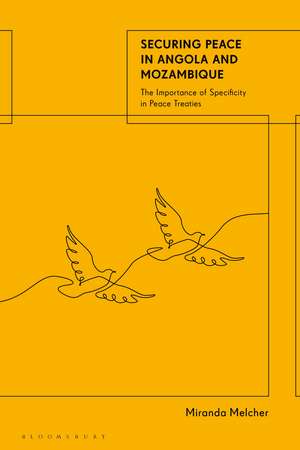Securing Peace in Angola and Mozambique: The Importance of Specificity in Peace Treaties
Autor Dr Miranda Melcheren Limba Engleză Hardback – 17 apr 2024
Preț: 511.07 lei
Preț vechi: 731.61 lei
-30% Nou
Puncte Express: 767
Preț estimativ în valută:
97.82€ • 106.29$ • 82.23£
97.82€ • 106.29$ • 82.23£
Carte tipărită la comandă
Livrare economică 21 aprilie-05 mai
Preluare comenzi: 021 569.72.76
Specificații
ISBN-13: 9781350407930
ISBN-10: 1350407933
Pagini: 258
Dimensiuni: 156 x 234 mm
Greutate: 0.54 kg
Editura: Bloomsbury Publishing
Colecția Bloomsbury Academic
Locul publicării:London, United Kingdom
ISBN-10: 1350407933
Pagini: 258
Dimensiuni: 156 x 234 mm
Greutate: 0.54 kg
Editura: Bloomsbury Publishing
Colecția Bloomsbury Academic
Locul publicării:London, United Kingdom
Caracteristici
Based on unique primary source data, including interviews with key actors who have participated in peace treaty negotiations in Angola and Mozambique, as well as thousands of previously unassessed UN archival documents
Notă biografică
Miranda Ruwart Melcher received her PhD in Defence Studies from King's College London. She received her MA in Intelligence and International Security from the Department of War Studies at King's College London, and her BA in Political Science from Yale University.
Cuprins
AcknowledgementsChapter 1: Introduction, Methodology, and Literature Review Chapter 2: The Angolan and Mozambican Civil Wars Chapter 3: Towards Peace: The Angolan Bicesse Accords and the Mozambican Rome Agreement Chapter 4: Diverging Paths: Failed Peace in Angola & Progress in Mozambique Chapter 5: Peace at last: Ending Angola's War and Reconstructing Mozambique Chapter 6: Treaty Writing and Implementation of Post-Conflict Military Integration: Discussion & ConclusionsBibliographyIndex
Recenzii
This book focuses on the fundamental questions of how to make peace and make sure that it holds. Miranda Ruwart Melcher patiently dissects two peace processes to glean important lessons on the need for specificity in peace process provisions rather than deferring difficult decisions to a later stage. This book represents a great addition to the Peace and Conflict Studies literature. It is highly recommended.
A solid study that offers new insights into the peace processes in Angola and Mozambique and thought-provoking suggestions regarding the importance of military reintegration provisions in peace agreements.
Securing Peace in Angola and Mozambique draws our attention to security sector reform as a crucial part of the peace process. The book systematically examines the behind-the-scenes dynamics of how peace treaties come into being, arguing for contextual sensitivity and specificity in treaty negotiations, terms, and implementation. This analysis contributes to the processual turn in the study of civil war and has important implications for our understanding of war-to-peace transitions in general and military integration in particular.
A solid study that offers new insights into the peace processes in Angola and Mozambique and thought-provoking suggestions regarding the importance of military reintegration provisions in peace agreements.
Securing Peace in Angola and Mozambique draws our attention to security sector reform as a crucial part of the peace process. The book systematically examines the behind-the-scenes dynamics of how peace treaties come into being, arguing for contextual sensitivity and specificity in treaty negotiations, terms, and implementation. This analysis contributes to the processual turn in the study of civil war and has important implications for our understanding of war-to-peace transitions in general and military integration in particular.
